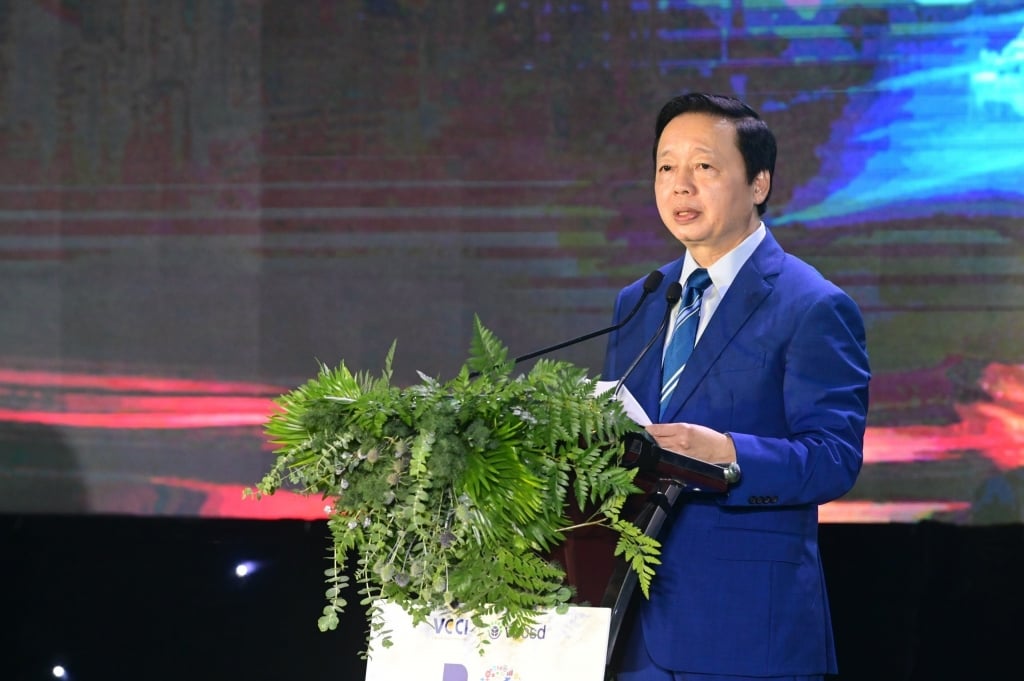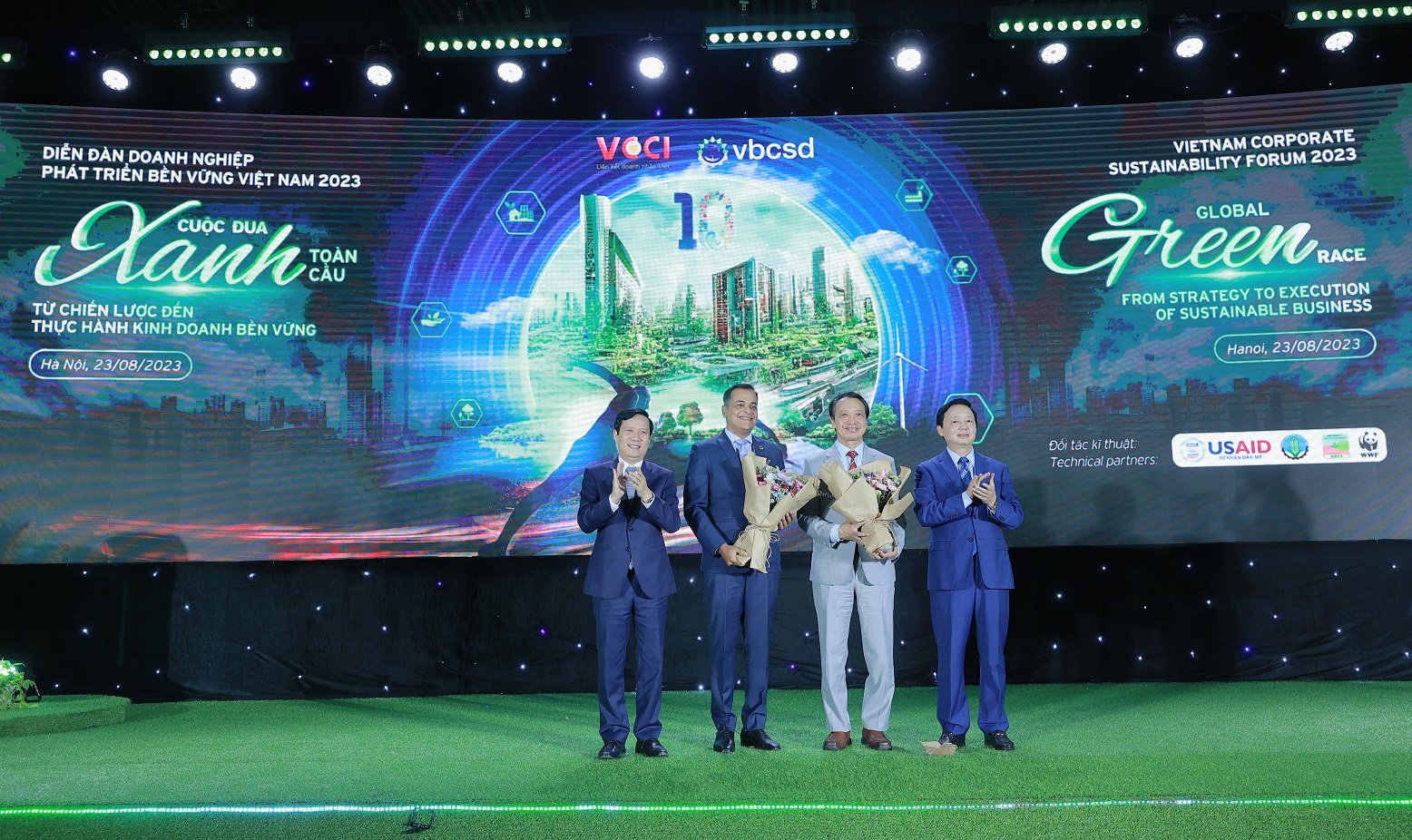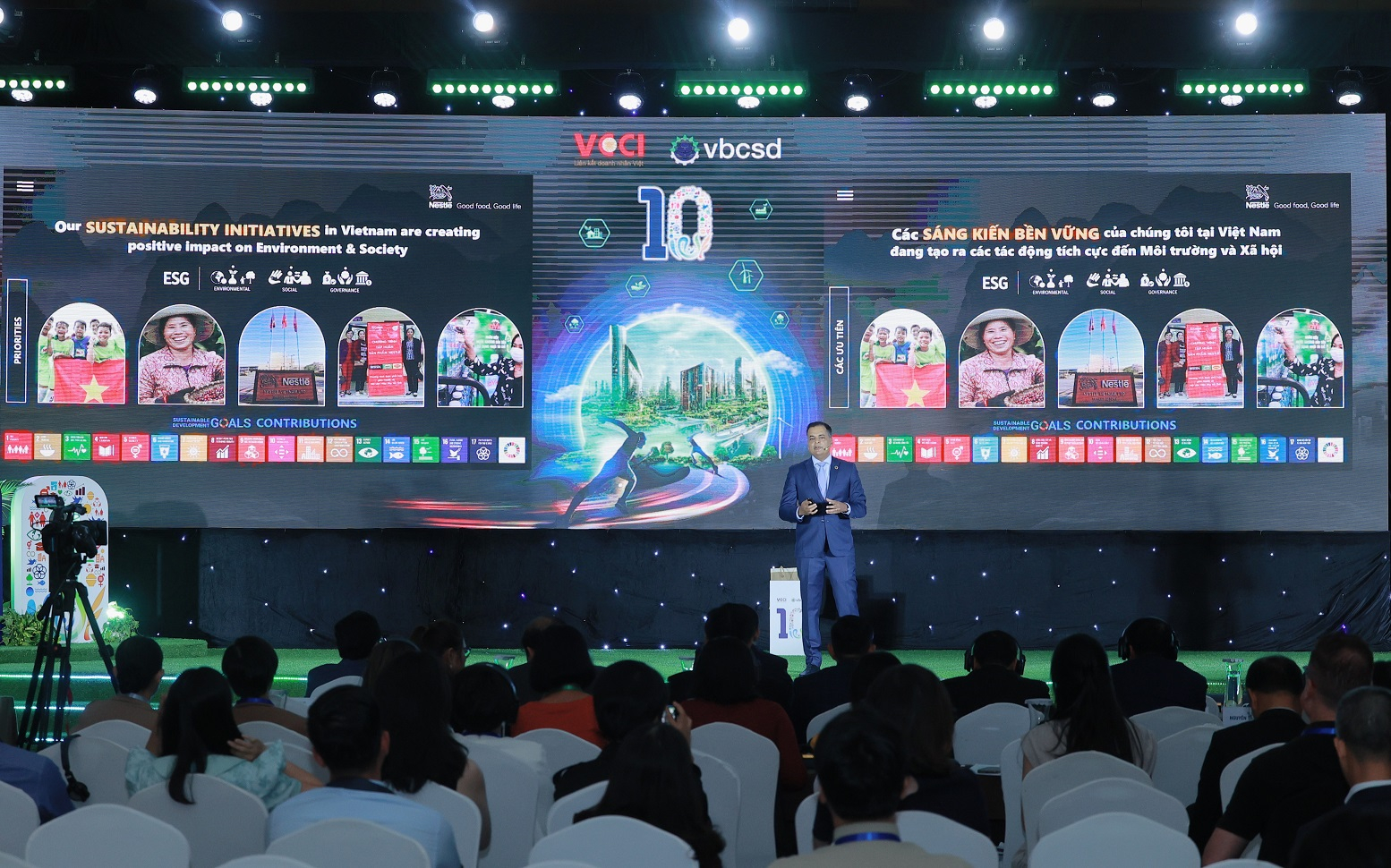June 19, 2025 | 06:52 GMT +7
June 19, 2025 | 06:52 GMT +7
Hotline: 0913.378.918
June 19, 2025 | 06:52 GMT +7
Hotline: 0913.378.918

Deputy Prime Minister Tran Hong Ha speaking at the forum. Photo: Tung Dinh.
On August 23rd, the Vietnam Chamber of Commerce and Industry (VCCI) and the Vietnam Business Council for Sustainable Development (VBCSD) organized the annual Vietnam Corporate Sustainability Forum (VCSF).
The theme of VCSF 2023 is " Global Green Race: From Strategy to Sustainable Business Practices".
In his keynote address during the Plenary Session of the Forum, Deputy Prime Minister Tran Hong Ha emphasized, "To contribute to realizing the SDGs and Vietnam's commitments, positive actions and policies in harmony with nature need to be integrated into business strategies, plans, and practices. Investment in nature-based solutions to enhance ecosystem services, reduce greenhouse gas emissions, strengthen climate resilience, and create new opportunities for innovation and growth is crucial."
Furthermore, Deputy Prime Minister also noted to the business community that sustainable development is not only for large enterprises but also for small and medium-sized enterprises, which are the backbone of the economy. They should actively participate in this green race.
Deputy Prime Minister pointed out several priorities that the domestic business community should focus on to promote sustainable development for both businesses and the country.
Firstly, businesses should research, apply, and implement sustainable development regulations and criteria, including the Corporate Sustainability Index (CSI) developed by VBCSD-VCCI. Alongside this, promoting the practice of ESG in corporate governance is essential.
Secondly, businesses should contribute efforts to natural preservation and ecological diversity protection.
Thirdly, to incorporate additional sustainable development solutions, businesses should leverage the achievements of the Fourth Industrial Revolution and accelerate digital transformation.

Deputy Prime Minister Tran Hong Ha presents flowers to VBCSD Chairman Nguyen Quang Vinh (2nd from right) and VBCSD Co-Chair Binu Jacob (3rd from right), acknowledging the successful 10-year journey of organizing VCSF. Photo: Tung Dinh.
Speaking at the forum, VCCI Chairman Pham Tan Cong shared, "This year's Vietnam Corporate Sustainability Forum (VCSF) marks the 10th year that VCCI has been leading its organization.
Over the course of a decade, amidst the unpredictable changes in the global landscape, the forum has been a platform for exchanging trends, directions, and strategies towards sustainable development. It's also a space to discuss challenges, innovations, and best practices in sustainable production and business, collectively defining goals for the upcoming period".
Representing VBCSD, Deputy Chairman of VCCI and Chairman of VBCSD Nguyen Quang Vinh brought updated insights on current global sustainable business trends to the Forum.
According to Mr. Vinh, facing the demands of sustainable development, the business community needs to redefine success. Success for businesses not only lies in financial figures but now encompasses adaptability, resilience, and recovery in the face of unprecedented challenges. Businesses must align their success and long-term growth with the sustainable interests of the community, society, and the environment.
Once businesses have shifted their mindset, they need to focus on key action priorities. This includes transforming the value chain and supply chain of businesses towards greater sustainability. It involves promoting transparency within companies and driving a dual transition (simultaneously embracing digital transformation along with the green transformation).

Mr. Binu Jacob, General Director of Nestlé Vietnam (NVL), and Co-Chairman of VBCSD, shared at the forum. Photo: Tung Dinh.
As a public-private dialogue forum, VCSF cannot be without the voice of the business community. In his presentation on "Innovation and Sustainable Development: Promoting Dual Transformation in Businesses," Mr. Binu Jacob, General Director of Nestlé Vietnam (NVL) and Co-Chairman of VBCSD, shared experiences and initiatives to drive sustainable development efforts through innovative renewal, aiming to have a positive impact on the environment and society.
In doing so, he provided practical and feasible recommendations for Vietnamese businesses to consider and implement. Promoting innovative renewal and sustainable development are two intertwined factors required to achieve business objectives while addressing societal issues.
Delving deeper into Nestlé's dual transformation, Mr. Binu Jacob stated that Nestlé is undertaking various sustainable initiatives to create positive impacts on the environment and society. These priorities include developing physical fitness and nutrition for children, responsible sourcing, climate change action, water resource management, enhancing women's empowerment, and developing sustainable packaging.
To fulfill its commitment to sustainable sourcing, Nestlé Vietnam has implemented the Nescafé Plan sustainable coffee cultivation program in the Central Highlands provinces since 2011.
The program has supported over 22,000 farming households in adopting and practicing coffee production based on the 4C criteria, provided training for over 330,000 farmers, distributed 63.5 million disease-resistant coffee seedlings, and improved yields, enabling the rejuvenation of older coffee plantations.
The program has contributed to reducing fertilizer usage by 20% and saving 40% of irrigation water in coffee cultivation, resulting in 30-100% income growth for farmers through efficient intercropping practices.
The program has also integrated digital technology into the development of farming diary tools, allowing farmers to efficiently manage their production activities through software applications, replacing the conventional paper-based management.
Translated by Nguyen Hai Long
![Turning wind and rain into action: [9] Digitizing hydrometeorological data in response to climate change](https://t.ex-cdn.com/nongnghiepmoitruong.vn/608w/files/news/2025/06/17/z6704423696987_15fd32ffc26d590d204d520c9dac6786-nongnghiep-165943.jpg)
(VAN) Farmers have begun accessing hydrometeorological applications to adjust their cropping schedules, aiming to ensure productivity and adapt to climate change.
![Turning wind and rain into action: [8] Real-time salinity detection and early warning technology](https://t.ex-cdn.com/nongnghiepmoitruong.vn/608w/files/news/2025/06/17/z6704423696987_15fd32ffc26d590d204d520c9dac6786-nongnghiep-151127.jpg)
(VAN) Thanks to the integration of modern hydrological-hydraulic models, remote sensing technologies, and artificial intelligence, the accuracy of hydrological forecasting has significantly improved.
![Turning wind and rain into action: [7] Early disaster warnings help marine farmers minimize losses](https://t.ex-cdn.com/nongnghiepmoitruong.vn/608w/files/news/2025/06/17/z6704423696987_15fd32ffc26d590d204d520c9dac6786-nongnghiep-142942.jpg)
(VAN) In recent years, thanks to early disaster warnings and forecasting, marine farmers in Khanh Hoa province have been able to reduce risks and losses, thereby improving production efficiency.
![Turning wind and rain into action: [6] ‘Four on-the-spot’ disaster management software](https://t.ex-cdn.com/nongnghiepmoitruong.vn/608w/files/news/2025/06/17/e5a48259d6a262fc3bb3-nongnghiep-183800.jpg)
(VAN) By simply activating the scenario on the disaster management software, the relevant authorities immediately know how many households need to be evacuated, where to evacuate them to, and by what means of transportation…
![Turning wind and rain into action: [5] Hue applies modern technology in disaster forecasting](https://t.ex-cdn.com/nongnghiepmoitruong.vn/608w/files/news/2025/06/17/z6704423696987_15fd32ffc26d590d204d520c9dac6786-nongnghiep-093938.jpg)
(VAN) In Hue city, modern technology has recently been applied in meteorological and hydrological forecasting and warning, helping to reduce the damage caused by natural disasters.

(VAN) A cutting-edge farming technique being implemented on an experimental ranch in Arizona's Sonoran Desert has already saved a billion gallons of water over five years, according to Civil Eats.

(VAN) Poultry and pig production and the environment can be boosted through enhanced water technology, according to new research.